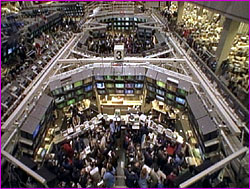
|
 |
|
Part 2 | Back to Part 1 The real daytraders In terms of impact, however, dabblers like Eddy Sweileh are as squeaks to the roars of serious, full-time daytraders. As Sweileh says, "I'm not a daytrader. I trade stocks—I trade a lot—but you can't put me in with those guys." "Those guys" are the traders who chuck it all to take up trading. They occupy cubicle farms in big cities around the U.S.—and sometimes trade from home—with small-time brokerages backing them, sometimes $10 for every dollar they'll put up. These are the hard-core traders, not the goofy characters from the Ameritrade TV commercials. Successful full-time daytraders may do 15,000 to 25,000 trades a year, creating huge commissions for their clearing firms. They might be operating as individuals, but they're engaged in quite a high-stakes profession. Their odd, risk-prone world was infamously exposed last August by the psychotic killer Mark Burton. After losing everything while daytrading, Burton shot and killed nine people in Atlanta in a two-day spree. Just two weeks after the shooting, the North American Securities Administrators Association released a report stating that seven out of 10 of these all-out daytraders lose everything. Many professional traders take issue with how these committed daytraders operate. "In my opinion, what they've done has exacerbated every move that the market is having," says Tim Heekin, the influential director of trading at Thomas Weisel Partners in San Francisco. "They're jumping in when they see a move, and suddenly stocks that were up a half are up one and a half. If the stock starts to slip, they jump out of the way." Professional money managers are rightly concerned about losses contaminating the markets. They know that the October 1929 crash scared two generations out of the market. They worry that irrational, reckless traders might spoil their nest. "I'm not in favor of this kind of trading, unless this is a long-term phenomenon," says Heekin. If it's short-term—in other words, if these daytraders are trading only while the market is robust and will flee the scene at the first downturn—then it's not helping anybody. "People are dabbling with their life's savings," Heekin says. "Would you be in favor of getting more people to Las Vegas and having them lose everything? They're turning the market more casino-like. You've got uneducated people saying, `I'm gonna quit my day job, trade, and own an island. I just don't think these guys—uneducated, unqualified—should be whipping these stocks around."
Do daytraders add to volatility? Undoubtedly. But all they're doing is trading stocks. Volatility might be difficult to stomach, but volatility is the lifeblood of the markets. If prices don't change, trades don't happen. If trades don't happen, stocks are superfluous. Without stocks, new business would not get funded, new fortunes would not be made, new technologies would not get invented. And people like Eddy Sweileh would have to find other ways to supplement their income. Which is something Sweileh would just as soon not do. "We can get very busy here," he says, surveying a long line winding to the door of his shop. "And it's tiring after I spend the morning online, then all this. But at the end of the day, I think it's worth it." Cory Johnson writes the "Silicon Babylon" column for TheStreet.com, an online investment and financial news publication. Based in San Francisco, he does a daily stock market report on KNBR radio and is a regular guest on the ZDNews television program and NPR's "MarketPlace." Photos/Images: (1) Photodisc/C Squared Studios; (2,3) Corbis; (4) Credit Suisse First Boston; (5) IPO Monitor; (6) Photodisc/Keith Brofsky; (7) ©BBC. The Formula That Shook The World | Impact of Online Trading A Trader's Lexicon | Play a Virtual Market | Resources Transcript | Site Map | Trillion Dollar Bet Home Editor's Picks | Previous Sites | Join Us/E-mail | TV/Web Schedule About NOVA | Teachers | Site Map | Shop | Jobs | Search | To print PBS Online | NOVA Online | WGBH © | Updated November 2000 |
 Daytrading as your only source of income is a risky
business, yet at least 45,000 people have taken the
plunge.
Daytrading as your only source of income is a risky
business, yet at least 45,000 people have taken the
plunge.
 The long-term impact of online trading on the world's
financial markets remains an unknown.
The long-term impact of online trading on the world's
financial markets remains an unknown.